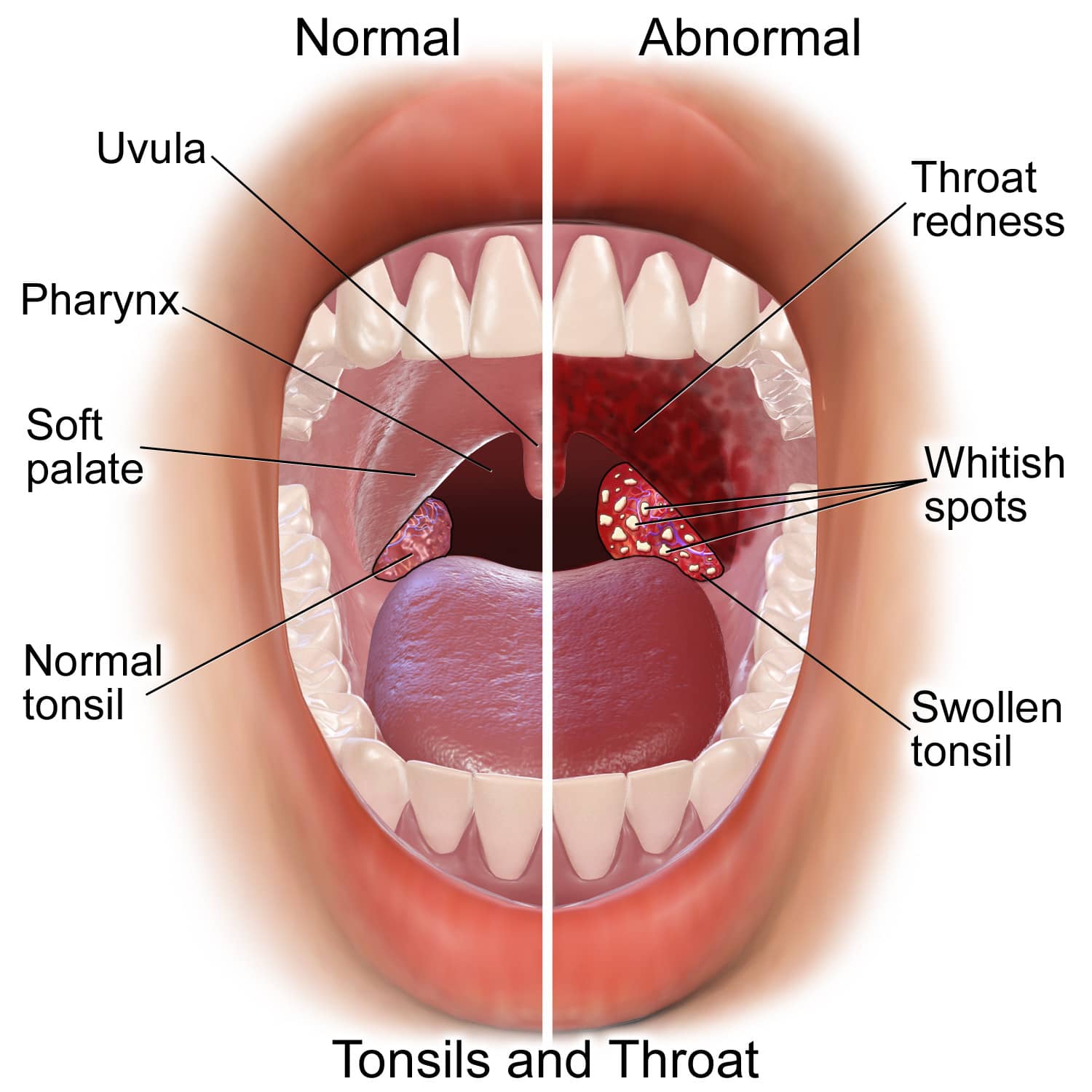
Sore throat, also called tonsillitis, is an inflammatory condition affecting the tonsils of the pharynx. It can be caused by both bacteria and viruses, and the effect of these pathogens on the body varies depending on their biological nature.
Sore throat caused by bacteria
The most common cause of bacterial sore throat is Streptococcus pyogenes, known as group A beta-hemolytic streptococcus. These bacteria cause about 15-30% of all cases of sore throat in adults and an even greater proportion in children. Bacteria multiply in the throat and tonsils, releasing toxins and enzymes that damage tissue and cause an inflammatory reaction. It causes symptoms such as a severe sore throat, difficulty swallowing, fever, enlarged and painful lymph nodes in the neck and throat, and swollen tonsils, sometimes with white spots or blisters on the tonsils.
Rapid strep tests or additional tests are often used to diagnose a bacterial infection. Treatment usually includes antibiotics, which help to quickly relieve symptoms, prevent complications and reduce the risk of spreading the infection.
Angina caused by viruses
Most cases of sore throat (about 70-85% of cases in adults and an even greater proportion of cases in children) are caused by viruses. The most common viruses that cause sore throats are rhinoviruses (which cause the common cold), influenza and parainfluenza viruses, adenoviruses, and the Epstein-Barr virus (which causes infectious mononucleosis). Viruses infect the epithelial cells of the throat and tonsils, causing inflammation and tissue damage. Viral sore throat symptoms are similar to bacterial sore throat, including sore throat and redness, but more often accompanied by common cold symptoms such as nasal congestion, sneezing, cough and not always a high fever.
In the case of viral sore throat, antibiotics are ineffective because they do not work on viruses. Treatment is usually symptomatic to relieve the patient's condition and includes pain relief, adequate fluid intake and rest. Antipyretics (medicines to reduce fever) or non-steroidal anti-inflammatory drugs may sometimes be prescribed.

Why do some people get angina more often?
Angina is a complex disease that depends on various factors, including the state of the immune system, age, lifestyle, environmental factors and genetic predisposition. Some people are more prone to angina because of the following reasons:
The state of the immune system
The strength and effectiveness of the immune system are key factors in a person's vulnerability to infectious diseases, including strep throat. Individuals with weakened immune systems due to conditions such as HIV/AIDS, taking immunosuppressants after an organ transplant, or having other immune system disorders are more vulnerable.
Age
Children and adolescents are particularly prone to strep throat, especially strep throat, because their contact with microbes at school or in other social settings is greater, and their immune systems are not yet fully exposed to many pathogens. But adults who work or live in tight-knit communities may also be at higher risk.
Lifestyle and environmental factors
Smoking and drinking alcohol can increase the risk of sore throat, as these factors irritate the mucous membrane of the throat and can weaken local immune defenses. Air pollution and prolonged stay in dry rooms can also have an effect. In addition, people who are frequently exposed to cold weather conditions or who do not follow hygiene standards are more vulnerable to infections.
Genetic predisposition
Although direct genetic links to a specific form of angina are not clear, research suggests that some individuals may have a greater genetic predisposition to certain inflammatory responses or features of the immune system that increase their risk of developing the disease. For example, variants in certain immunoglobulin or cytokine genes can influence a person's response to infections.
Social and economic conditions
People who live or work in cramped, poorly ventilated spaces and those who do not have the opportunity to maintain proper personal hygiene are more prone to various infections, including strep throat. This includes schools, kindergartens, prisons and other institutions where there is a high density of people.
Psychological stress
Stress can also affect the functioning of the immune system, weakening the body's ability to fight infections. Individuals who experience constant psychological stress may be more vulnerable to various health problems, including infectious diseases such as angina.
Therefore, although all people can develop angina, these factors may increase the risk for certain individuals. Understanding these factors can help people take preventive measures, such as strengthening the immune system, avoiding harmful habits, maintaining personal hygiene, and avoiding risk conditions to reduce the likelihood of strep throat.
:max_bytes(150000):strip_icc()/overview-of-strep-throat-1191987_final-21489a625c774930abb4a3c12e13b0a6.png)
Information sources
- Centers for Disease Control and Prevention (CDC)
- World Health Organization (WHO)
- National Health Service (NHS)
- Mayo Clinic
# angina






